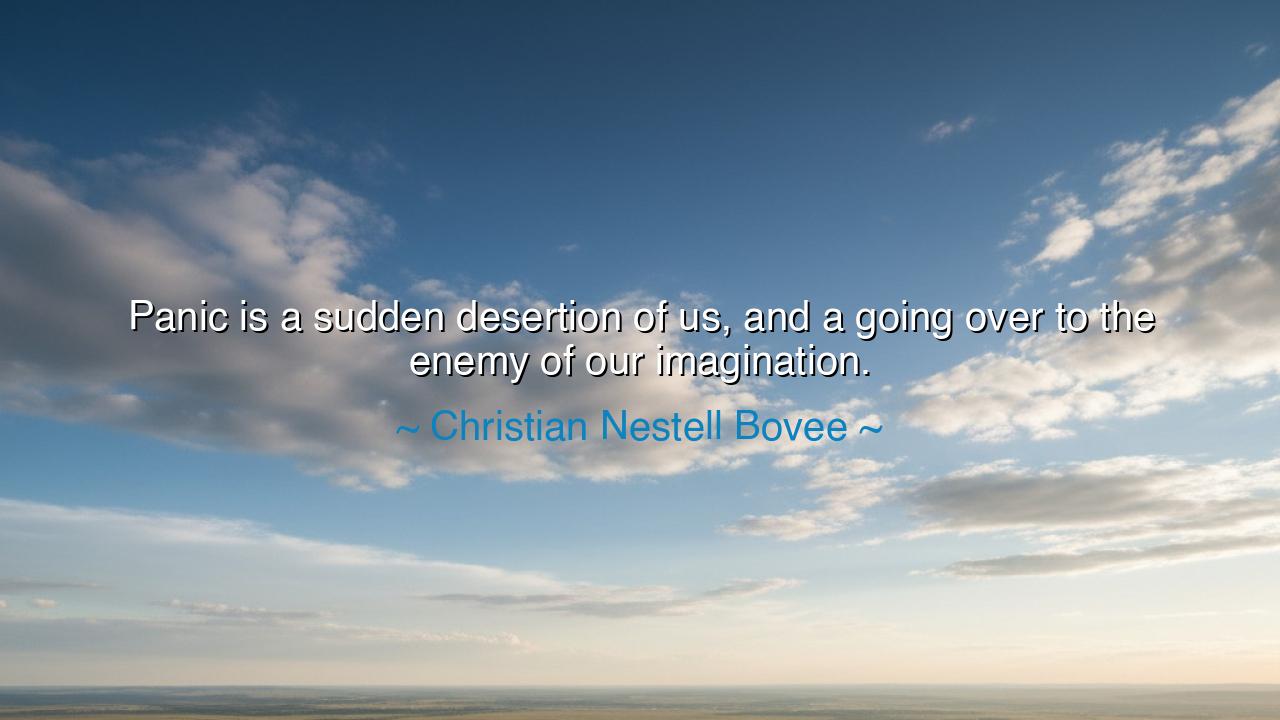
Panic is a sudden desertion of us, and a going over to the enemy






“Panic is a sudden desertion of us, and a going over to the enemy of our imagination.” Thus wrote Christian Nestell Bovee, the American philosopher of reflection, whose words burn with the insight of one who has watched courage crumble in the face of unseen fears. In this quote, Bovee speaks not merely of fear, but of panic — that wild, consuming force which robs us of reason, of faith, and of our very selves. He likens it to a desertion, a betrayal in the heart of battle, when the mind, instead of standing firm beside us, takes flight and joins the enemy of our imagination.
For in truth, it is not the world itself that defeats us most swiftly, but the imagination turned against us. The mind, which is meant to be our shield, becomes our sword-bearer’s betrayer. When panic arises, the imagination — once the wellspring of creation and vision — becomes an architect of horror. It multiplies shadows, magnifies threats, and paints monstrous illusions upon the walls of our thoughts. Thus, what was once the fountain of our power becomes the forge of our undoing. Bovee’s words remind us that the battlefield of life is not fought only with hands and deeds, but within the silent citadel of the soul.
Think, if you will, of the soldiers at Thermopylae, where three hundred Spartans stood against an ocean of enemies. Had panic ruled their hearts, they would have fled long before the dawn of glory. But their imagination was not conquered — they saw not death, but immortality; not defeat, but destiny. Their minds remained loyal, even as their bodies faced annihilation. They triumphed not by numbers, but by steadfastness. This is the power of mastering one’s imagination: to keep it an ally, even when terror whispers its deceit.
Yet history also tells us of the reverse — of empires undone by panic, of armies that fled not from the sword, but from the shadows of their own fears. In ancient Rome, it was said that an entire legion once broke ranks because a cloud of dust on the horizon was mistaken for an approaching horde. There was no enemy — only the reflection of their own imagination, turned traitor. Thus, Bovee’s warning stands as timeless counsel: when we surrender to panic, we do not fall to the world’s blows, but to the phantoms of our own minds.
But let us not scorn the imagination, for it is not evil in itself. It is a mighty servant, capable of both ruin and redemption. The same imagination that invents despair can also envision courage. It is the inner artist that paints our perception of life — whether in hues of terror or triumph. The wise therefore learn to discipline their imagination, as a warrior trains his horse: to guide it through storms, not let it bolt into darkness. For to command one’s imagination is to command one’s fate.
Consider Amelia Earhart, soaring alone over endless oceans, where the slightest error could mean death. She too had imagination — but hers was governed, not ruled. It did not whisper of crashing waves or burning engines; it spoke of horizons, of the vast beauty of human daring. In her, we see the opposite of panic: a spirit that kept faith with itself, even when surrounded by uncertainty. Her courage was not the absence of fear, but the mastery of it — the refusal to let the enemy of imagination take her captive.
And so, my friend, when panic seizes you — when your heart begins to race and your thoughts turn against you — remember Bovee’s teaching. Stand still. Breathe deeply. Do not let your mind defect to the enemy. Call your imagination back to your side, and remind it of its true purpose: not to destroy, but to create; not to weaken, but to fortify. Let it show you paths forward, not pitfalls beneath.
For the great lesson is this: the imagination is a double-edged gift — it can be the ally of courage or the servant of fear. When panic comes, it is nothing more than your own forces turning upon you. Reclaim them. Rally your spirit. Speak to yourself as a general to his troops: “Stand fast, for I am still here.” For when you regain command of your imagination, you will discover that there is no greater power — and no truer victory — than the mastery of your own mind.






AAdministratorAdministrator
Welcome, honored guests. Please leave a comment, we will respond soon